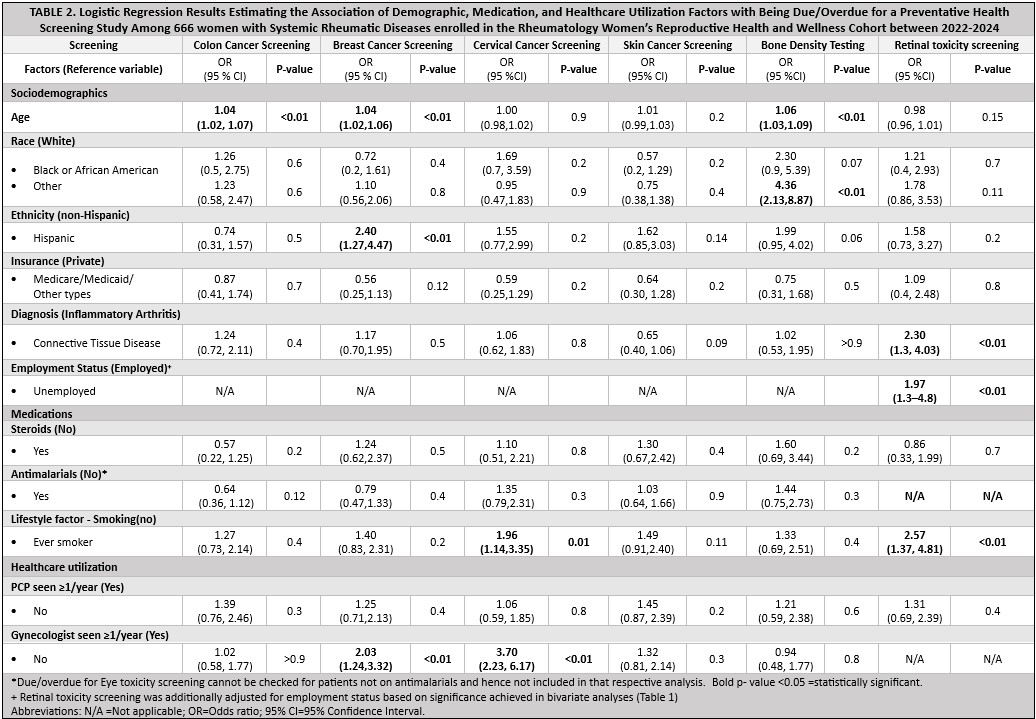Session Information
Date: Sunday, October 26, 2025
Title: (0357–0386) Patient Outcomes, Preferences, & Attitudes Poster I
Session Type: Poster Session A
Session Time: 10:30AM-12:30PM
Background/Purpose: Timely preventative health screenings in women with systemic rheumatic diseases (SRDs), especially those with other chronic conditions or who are on immunosuppressive therapy, may improve outcomes through early detection. This study aimed to identify demographic, lifestyle, disease-related, and healthcare utilization factors associated with delayed preventative health screenings in this population.
Methods: We included women aged 18-65 evaluated at Hospital for Special Surgery (HSS) by a rheumatologist ≥2 times who enrolled in the HSS Rheumatology Women’s Reproductive Health and Wellness Cohort between 12/2022- 5/2024 and completed a standardized questionnaire on their preventative health screening status. Patients reported being “due or overdue” for six screenings: colon, breast, cervical, and skin cancers; bone density; and retinal (eye) toxicity screening. We evaluated the degree of delay and the reasons for delay. Descriptive analyses compared demographics, lifestyle factors, SRD status, medication use, and healthcare utilization for patients “due/overdue” versus those not due/overdue for the screenings. Multivariable logistic regression analyzed factors associated with being due/overdue for each screening.
Results: Among 666 women included in this cross-sectional analysis, increased age was associated with being due/overdue for colon, breast, and skin cancer, as well as bone density screening, and patients with ‘other’ or Black race, but not White race were more frequently due/overdue for bone density screenings (Table 1). Hispanic versus non-Hispanic women were more frequently due/overdue for breast (21% vs. 11%) and eye toxicity screenings (20% vs. 11%). Ever smokers were also more likely to be due/overdue for breast, cervical, skin cancer, bone density, and eye toxicity screenings than non-smokers, and SRD status was significantly different only for eye toxicity screenings(Table 1).In multivariable analyses, factors associated with being due/overdue for a particular screening test included: increased age (OR=1.04, 95%CI 1.02–1.07) for colon cancer; increased age (OR=1.04, 95%CI 1.02–1.06), Hispanic ethnicity (OR=2.40, 95% CI 1.27–4.47), and < 1/year gynecology visits (OR=2.03, 95% CI 1.2–3.3) for breast cancer; ever smoking (OR=1.96, 95% CI 1.14-3.35) and < 1/year gynecology visits (OR=3.70, 95% CI 2.2–6.1) for cervical cancer; increasing age (OR=1.06, 95%CI 1.03–1.09) and ‘Other’ vs. white race (OR=4.36, 95% CI 2.13-8.87] for bone density; and ever smoking(OR=2.57, 95 % CI 1.37-4.81), CTD status (OR=2.30, 95% CI 1.3–4.03) and unemployment(OR=1.97, 95% CI 1.3–4.8) for eye toxicity screening (Table 2). Degrees of self-reported delays were most typically < 1 year (Figure). The most common reasons for delay were forgetfulness and scheduling difficulty (data not shown).
Conclusion: Preventative health screening delays in a cohort of women with SRDs were influenced by age, Race, Ethnicity, smoking history, CTD diagnosis, employment status, and infrequent gynecology visits. Targeted strategies are needed to improve adherence to suggested screenings and thereby reduce health risks in this vulnerable population.
 Table 1. Demographic, Socioeconomic, Lifestyle, Disease, and Health Utilization Factors in 666 women with Systemic Rheumatic Diseases Enrolled in the Rheumatology Women’s Reproductive Health and Wellness Cohort between 2022 and 2024, by their Preventative Health Screening Status for Six Screening Evaluations
Table 1. Demographic, Socioeconomic, Lifestyle, Disease, and Health Utilization Factors in 666 women with Systemic Rheumatic Diseases Enrolled in the Rheumatology Women’s Reproductive Health and Wellness Cohort between 2022 and 2024, by their Preventative Health Screening Status for Six Screening Evaluations
.jpg) Table 2. Logistic Regression Results Estimating the Association of Demographic, Medication, and Healthcare Utilization Factors with Being Due/Overdue for a Preventative Health Screening Study Among 666 women with Systemic Rheumatic Diseases enrolled in the Rheumatology Women’s Reproductive Health and Wellness Cohort between 2022 and 2024
Table 2. Logistic Regression Results Estimating the Association of Demographic, Medication, and Healthcare Utilization Factors with Being Due/Overdue for a Preventative Health Screening Study Among 666 women with Systemic Rheumatic Diseases enrolled in the Rheumatology Women’s Reproductive Health and Wellness Cohort between 2022 and 2024
.jpg) Figure: Degree of Delay in Health Screenings Among 666 Women with Systemic Rheumatic Diseases Enrolled in the
Figure: Degree of Delay in Health Screenings Among 666 Women with Systemic Rheumatic Diseases Enrolled in the
Rheumatology Women’s Reproductive Health and Wellness Cohort between 2022 -2024
To cite this abstract in AMA style:
Kannayiram S, Smole A, Masto L, Kim Y, Nagpal N, Piatchou Donfack N, Jannat-Khah D, Mandl L, Lieber S, Siegel C, Lockshin M, Sammaritano L, Barbhaiya M. Preventative Health Screening Practices Among 666 Women with Systemic Rheumatic Diseases from the Hospital for Special Surgery Rheumatology Women’s Reproductive Health and Wellness Cohort: A Cross-Sectional Analysis [abstract]. Arthritis Rheumatol. 2025; 77 (suppl 9). https://acrabstracts.org/abstract/preventative-health-screening-practices-among-666-women-with-systemic-rheumatic-diseases-from-the-hospital-for-special-surgery-rheumatology-womens-reproductive-health-and-wellness-cohort-a-c/. Accessed .« Back to ACR Convergence 2025
ACR Meeting Abstracts - https://acrabstracts.org/abstract/preventative-health-screening-practices-among-666-women-with-systemic-rheumatic-diseases-from-the-hospital-for-special-surgery-rheumatology-womens-reproductive-health-and-wellness-cohort-a-c/
